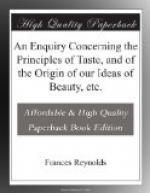Evidently Johnson’s stringent objections temporarily halted her plans, for we hear nothing more about the essay for two years. Meanwhile, as appears from a later letter, she showed it to Bennett Langton, hoping in vain for his help. Nevertheless, she was determined to go ahead and print the work, even at her own expense. Johnson, still counted upon for aid, wrote to her on 12 April 1784:
I am not yet able to wait on you, but I can do your business commodiously enough. You must send me the copy to show the printer. If you will come to tea this afternoon we will talk together about it.[3]
On 30 April he commented further: “Mr. Allen has looked over the papers and thinks one hundred copies will come to five pounds.” Something, however, made her suspicious of his advice, and on 28 May there came an end to Johnson’s connection with the matter. He wrote: “I have returned your papers, and am glad that you laid aside the thought of printing them.”
But Miss Reynolds had no intention of permanently giving up her project. Instead she rewrote parts of the essay which had displeased her critics, and shortly after Johnson’s death proceeded to have 250 copies privately printed, with a dedication to Mrs. Montagu. With Johnson gone, “The Queen of the Bluestockings” must have appeared the next best patron. That Mrs. Montagu, while no doubt flattered by the dedication, was herself not overly enthusiastic about the essay may be gathered from a letter written to her by Miss Reynolds on 12 July 1785. Miss Reynolds began by insisting that “the slightest hint” of disapprobation on the part of Mrs. Montagu would “consign the work to oblivion”; then continued:
I never did entertain any desire to publish it, tho I might to sell it. And my desire of printing it, originated from a motive which tho’ vain I allow, is an natural vanity I wishd to leave behind me a respectable memorial of my existence, which I then flatterd myself this would be. Ten impressions or twenty at the most, were all I wishd to have taken off. Why I had so many as 250 was because Dr. Johnson advised me to print that number, and to sell them, to stand the sale of them was his expression, but I must do Dr. Johnson the justice to say, that, that advice was given me with a proviso that no person was in the secret but himself, for on my informing him to the contrary, he declined or seemd to decline the affair of getting them printed for me, which I perceiving sent to him for the manuscript, foolishly entertaining a slight suspicion which I much reproach myself for, that some other motives besides the want of merit in the work had influenced this change of behaviour. Unluckily from the beginning I made too great allowance in its favour, from an opinion I had con too of Dr. Johnsons being strongly prejudiced against womens literary productions. But I deceived myself. He was sincere, he judged justly of the work, and his opinion exactly corresponded with yours![4]
Not that she regretted the cost of printing the 250 copies. That was a minor consideration. She concluded:




